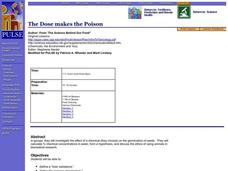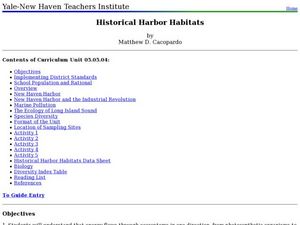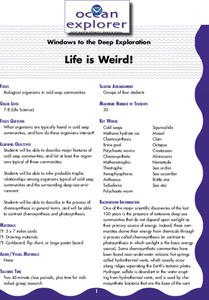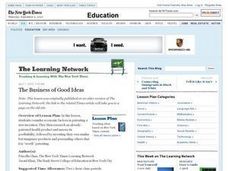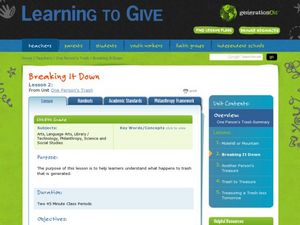Curated OER
Pheed the World: Edible Phyla
Students discuss the contributions of different organisms to our world. In this biology lesson, students research countries with limited food supply. They create an improvement plan for a fictitious country assigned to them.
Curated OER
The Dose makes the Poison
Students investigate the effect of a chemical (they choose) on the germination of seeds. They calculate % chemical concentrations in water, form a hypothesis, and discuss the ethics of using animals in biomedical research.
Curated OER
Animals of the Fire Ice
Students examine ocean life by identifying methane hydrates. In this ocean life lesson, students research organisms that live in the coldest, deepest parts of the ocean and live off methane hydrates. Students create a group...
Curated OER
From Farm to Table
It's important for students to understand where our food comes from and the environmental implications of agriculture.
Curated OER
Biomass: The Energy of the Future
Sixth graders examine information about a variety of renewable fuels. They read key vocabulary terms, read and discuss a story handout, and conduct research on renewable fuels. Students then complete a comparison chart, and write an...
Curated OER
Global Warming Statistics
Students research real-time and historic temperature data of U.S. and world locations, and analyze the data using mean, median, and mode averages. They graph the data and draw conclusions by analyzing the data. A spreadsheet is used to...
Curated OER
Historical Harbor Habitats
Tenth graders create food web displays in the classroom. In this ecology lesson, 10th graders identify the different pollutants in the environment and their effect on organisms. They collect samples of sediments from the harbor and...
Curated OER
A Field of Beans
Beans, or legumes as they are sometimes called, are the topic for an integrated multi-subject lesson. Youngsters will read, write, observe, and research everything there is to know about beans. They read a bean story, conduct a bean...
Curated OER
Make it a habitat
Students consider the adaptation of life forms through natural selection to fill various niches and accommodate changing environmental conditions. They select an ecosystem and conduct research to provide as much detailed information as...
Curated OER
What is Soap?
Students investigate soap, how it is made and its structure. In this soap lesson, students observe a demonstration of soap being made. Students observe the properties of soap and how soap performs in "real-life" situations like cutting...
Curated OER
Bad Algae!
Students explore algal blooms. In this ecosystem and health lesson, students define and describe harmful algal blooms, then discuss ways in which the impact of these algal blooms could be reduced. Students work in groups to research...
Curated OER
From Wolf to Dog
Students explain how dogs evolved from wolves based on the video. In this biology lesson, students research about breeding animals for specific traits. They interview dog owners and create a presentation about the dog.
Virginia Department of Education
Acid-Base Theory
Litmus paper, why so blue? A chemistry activity includes a pre-lab activity, practice calculating pH, an experiment measuring the pH in acids and bases, a titration demonstration, and a titration experiment.
United Nations
Compost Monitor Training
What should go in the trash, and what can be composted? Guide your young conservationists through the process of composing their trash with a lesson plan about the different ways we can dispose of garbage. Using a trash bag with clean...
NOAA
Make Your Own Volcano!
Make a volcano erupt in your own classroom! Young scientists use household and craft materials to model and simulate the eruption of a volcano.
Curated OER
Life is Weird!
Young scholars describe major features of cold seep communities, and list at least five organisms typical of these communities. They infer probable trophic relationships among organisms typical of cold-seep communities and the...
Curated OER
Forensic Detectives: Chemistry at Work
Young scholars examine the different careers associated with chemistry and see how it is used everyday. In this forensic lesson students research a chemistry related career and write a presentation to give to the class.
Curated OER
Ecological Relationships
Pupils identify ecological elements and their factors on species, populations and food webs. They analyze ecosystems for these elements and research how these factors influence species survival rate. Predictions on conditions over time...
Curated OER
the Business of Good Ideas
Young scholars consider economic factors in patenting a new invention. They research an already-patented health product and assess its profitability.
Curated OER
Biomass: The Energy of the Future
Students research renewable fuels. In this alternative energy lesson, students compile information and create a comparison chart on renewable resources. This lesson includes additional suggested readings, vocabulary, and a Biomass...
Curated OER
Health Benefits of Rice
Sixth graders examine the health benefits of rice. For this food benefits lesson, 6th graders discover the nutritious benefits of rice. Students research Celiac Sprue disease and how rice benefits the people with this disease.
Curated OER
Genetic Engineering
Students are introduced to the concept of genetic engineering. In groups, they participate in a variety of experiments, in which they analyze the effect of chemicals on different substances. Using the internet, they research gossypol,...
Curated OER
One Person's Trash: Breaking it down
Middle schoolers research how trash is disposed of and make an edible landfill. In this trash lesson plan, students research proper trash disposal, and discuss how trash affects the community. Then they make an edible landfill.
Curated OER
Microarrays: Chipping Away at the Mysteries of Science and Medicine
Students research microarrays on the internet in cooperative groups. Students write an essay describing the use of microarrays in environmental research and in medicine.



